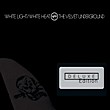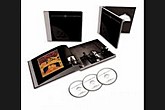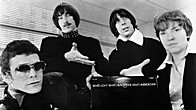|
|

The Velvet Underground Here's the gift that saved the Christmas for all Velvet fanatics. Something to ease the pain after the death of Lou Reed... White Light/White Heat was Velvet Underground's second album. Recorded by the classic quartet after the band had parted ways with pop art director Andy Warhol and German chanteuse Nico. Despite the album title it was the band's darkest, murkiest and dirtiest of them all. The only thing white here is the occasional white noise. It almost sounds as if parts of the album was recorded in the band's rehearsal room with only one or two microphones at a distance and the rest in a hurry in a cheap demo studio. Well it was recorded in just two days ... John Cale is said to have described it as 'consciously anti-beauty'. It most certainly is! The credited producer Tom Wilson (who mainly sat in with his feet on the mixing desk when he was present during the recording of the debut album) allegedly had to leave the premises during the recording of the second because he couldn't stand the cacophony. Songs filled with lyrics about violence and death, drugs and sex of the kinds that the hippies of the day didn't dare to think about. The sounds included noise, filth and fury ... And think of it, recorded in early September 1967, quite unheard of at the end of the summer of peace and love! A bold career move!! The kind of move to secure street credibility, indeed!!! The late guitarist Sterling Morrison put it this way: 'We were all pulling in the same direction. We may have been dragging each other off a cliff, but we were all definitely going in the same direction.' Of course it hardly received any positive reception initially, if any at all, and sold poorly. And of course it has been hailed as a masterpiece in retrospect. The album starts with the almost boogie and good time rock'n'roll of the title track, about the effects of methamphetamine. A song David Bowie and his band never got tired of performing, he admitted as recently as ten years ago. "The Gift" is distorted instrumental rock ramblings in one channel and John Cale reading a long story, more than eight minutes, of love, longing and a violent end in the other. "Lady Godiva's Operation" is about a transsexual that ends with being lobotomized. Once again John Cale has the lead vocals and initially it sounds quite normal. Enter Lou Reed nearly three minutes into the song who shouts more than sings some short passages of the lyrics and the song is not normal anymore. In addition Cale and Sterling Morrison is credited with medical sound effects on this one... The lyrics of "Here She Comes Now" don't say a lot. It's the only offer here for the faint-hearted, at least on the surface. But underneath it's disturbing. The song was later covered by Cabaret Voltaire, Nirvana and Galaxie 500. Time to flip the original LP and we're in for the real mayhem. "I Heard Her Call My Name" starts as a quick ordinary rocker apart from a wild distorted guitar that quickly fades out. It returns after 55 seconds for an ugly, wild, disoriented and disharmonic 40 seconds solo, then returns again for a second and equal disturbing solo that eventually brings the song to a violent death after two more minutes. This guitar effectively brought rock'n'roll to a new level. The backing track is quite distorted, too. Moe Tucker occasionally used trash cans as drums and I imagine she did so on this and the following eh ... song. You can feel and almost smell the fumes of vintage New York garbage. And the last song, sort of, is the 17 minutes of "Sister Ray". Wild, partly improvised, jazzy, distorted, dirty, perverse ... Let's not forget Cale's red-hot fuzzed-out organ here. Despite the length the track is the grandmother of punk, post punk, even rave for that matter, the following two decades. In Norway we even got a band named after this epos, Sister Rain...
The second disc of the Super Deluxe Edition include four bonus tracks in addition to the original six album mono tracks. Two mono single mixes (the title track and "Here She Comes Now") and two mixes of "The Gift", with only voice and only the instrumental backing track respectively. The third live disc includes seven songs, five of them previously unreleased. It demonstrates a tight little rock'n'roll combo performing two songs off White Light/White Heat, two off the debut album, the instrumental "Booker T", "I'm Not A Young Man Anymore" (only known version of this partly improvised song) and "Guess I'm Falling In Love". Even the 19 minutes version of "Sister Ray" sounds quite clean-cut compared with the album version despite some deliberate(?) feedback effect at the start. The biggest surprise of the disc is the instrumental version of "The Gift", laid-back in a way, despite feedbacks and more distortion than on the other tracks.
Copyright © 2014 JP
|
| You may also want to check out our Velvet Underground articles/reviews: The Velvet Underground & Nico : Deluxe Edition, The Velvet Underground Deluxe Edition and Super Deluxe Edition. |
| © 2014 Luna Kafé |
 Well, we're dealing with the Deluxe and Super Deluxe Editions of the album now, released a couple of moonths ago. The former includes the original stereo album augmented by seven bonus tracks on the first disc and a live recording from The Gymnasium, New York City in April 1967 on the second plus a thick booklet. The Super Deluxe Edition includes one more disc with the original mono album and alternative mono tracks and a hard cover book. Most of the bonus tracks have been released previously, for instance on the Velvet box Peel Slowly And See and the outtakes albums VU and Another View from the mid 1980s. The latter two included five tracks recorded by the classic quartet in early 1968 before John Cale left the band, and they're all here. Some of the bonus tracks on disc one have been remixed for the Deluxe editions and there is a previously unreleased early version of "Beginning To See The Light". Apart from an alternate take of "I Heard Her Call My Name" (slightly less ugly than the original album version) and a distorted instrumental version of "Guess I'm Falling In Love" the tracks sounds a lot neater than the original album tracks, closer to the eponymous third Velvet album recorded after Cale had left and substituted with Doug Yule. Here Cale's prominent viola playing from the debut album makes a welcomed return.
Well, we're dealing with the Deluxe and Super Deluxe Editions of the album now, released a couple of moonths ago. The former includes the original stereo album augmented by seven bonus tracks on the first disc and a live recording from The Gymnasium, New York City in April 1967 on the second plus a thick booklet. The Super Deluxe Edition includes one more disc with the original mono album and alternative mono tracks and a hard cover book. Most of the bonus tracks have been released previously, for instance on the Velvet box Peel Slowly And See and the outtakes albums VU and Another View from the mid 1980s. The latter two included five tracks recorded by the classic quartet in early 1968 before John Cale left the band, and they're all here. Some of the bonus tracks on disc one have been remixed for the Deluxe editions and there is a previously unreleased early version of "Beginning To See The Light". Apart from an alternate take of "I Heard Her Call My Name" (slightly less ugly than the original album version) and a distorted instrumental version of "Guess I'm Falling In Love" the tracks sounds a lot neater than the original album tracks, closer to the eponymous third Velvet album recorded after Cale had left and substituted with Doug Yule. Here Cale's prominent viola playing from the debut album makes a welcomed return. On 30 January it is 46 years since White Light/White Heat originally was released. Buy it any format or edition you want. It's still a vital part of rock history! Let's finish with some of Lou Reed's last public words, from August 2013 in preparation of the new editions: 'No one listened to it. But there it is, forever - the quintessence of articulated punk. And no one goes near it.'
On 30 January it is 46 years since White Light/White Heat originally was released. Buy it any format or edition you want. It's still a vital part of rock history! Let's finish with some of Lou Reed's last public words, from August 2013 in preparation of the new editions: 'No one listened to it. But there it is, forever - the quintessence of articulated punk. And no one goes near it.'